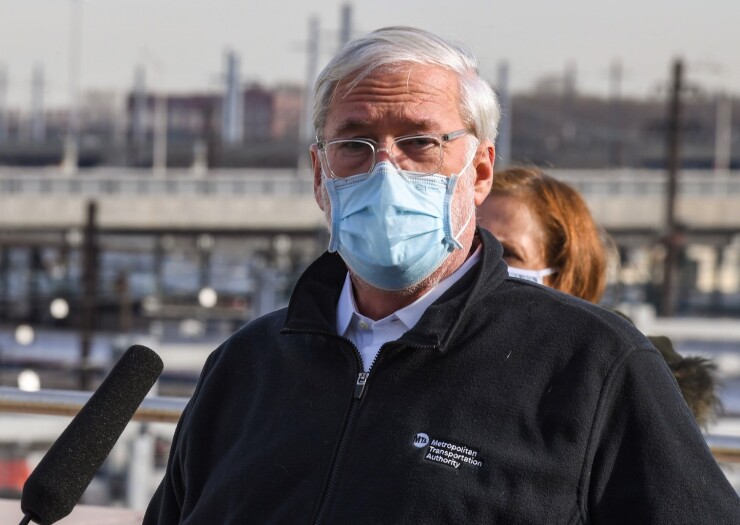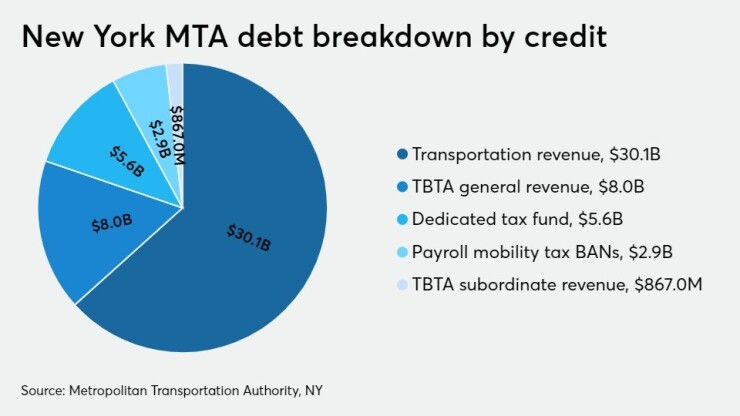In sidestepping for now a planned subway and bus fare increase — a public-relations third rail — New York’s Metropolitan Transportation Authority called a familiar crisis-management play. It bought time.
Its board on Thursday agreed at Chairman Patrick Foye’s urging not to vote on a 4% biennial fare and toll hikes.
The state-run MTA, which operates mass transit in the New York City region, is in line for $4 billion from the federal rescue bill passed last month and the prospects of an even bigger aid package under President Biden and new Senate majority leader, New York Democrat Charles Schumer.

David Loesch, owner of DRL Group, a Katy, Texas-based firm that sells municipal securities, expects widespread reliance on help from Washington as the COVID-19 crisis prolongs.
“I suspect many other transit authorities will do the same,” he said in a commentary.
Still, the authority, one of the largest municipal issuers with $47.5 billion of core-credit debt, faces a budget crunch and a variety of pandemic-related uncertainties.
They include stay-at-home mandates and preferences; rising crime in the system and the city it serves; the effectiveness of vaccine rollouts; the extent of coronavirus variants; a spike in vehicle purchases; and how quickly the U.S. Department of Transportation lifts its hold on congestion pricing for Manhattan, which could generate $15 billion annually for the MTA’s capital program.
A name familiar to the MTA, former board member and former city transportation commissioner Polly Trottenberg, is Biden's choice as U.S. deputy secretary of transportation.
New York State, which runs the MTA and has itself called for massive Washington aid, casts a separate shadow.
Gov. Andrew Cuomo on Tuesday released multiple budget scenarios for fiscal 2022, depending upon how much federal aid it receives.
Rachael Fauss, senior research analyst for the good-government organization Reinvent Albany, said the MTA is vulnerable to “opaque withholdings” from Albany.
Division of the Budget documents, according to Fauss, show the MTA will get $1 billion less from state-created dedicated taxes and funding than was planned for in the current adopted fiscal 2021 budget, to $5 billion from $6 billion.
“Yet, DOB does not explain if the MTA’s missing billion dollars is because of lower tax revenue, or diversions of dedicated fund revenue to the general fund,” she said. “The budget is abnormally secretive.”
Asked at his press conference on Thursday, Foye said: “I’m not going to speculate on that.” He called himself agnostic on possible new revenue sources that might help the MTA, even if indirectly. They include a millionaire's tax, legalized marijuana and online sports betting.
"We're looking for funding that ideally is sustainable, recurring, grows with the economy and is not terribly volatile," he said.
Foran said the authority, which is crafting its February financial plan, faces an $8 billion deficit for 2022 to 2024 even with the latest infusion from Washington.
Transit advocates worry that the MTA will simply revive fare-hike talks in a few months. “They shouldn’t be considered at all this year,” said Lisa Daglian, executive director for the Permanent Citizens Advisory Committee to the MTA.
Foye said the board would debate increases to tolls on its bridges next month. Staten Island and Queens resident toll discounts would remain, he added.

“As we all know, there are some fundamentally important issues that we face … fares, safety of the workforce and the public, fare evasion, debt service and the levels of debt service and procurement,” board member Robert Linn said.
Despite federal money, an insufficient ridership return will continually pressure the MTA’s operating and capital budgets, Fitch Ratings said.
“Other gap-closing actions, such as increased deficit borrowing, deferring capital spending or use of any remaining reserves could further weaken the authority's credit profile."
According to finance director Patrick McCoy, the MTA’s roughly $10.5 billion of





